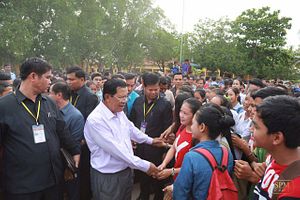The Cambodian economy is stumbling, with a government struggling to deal with issues like escalating non-performing loans (NPLs), interest rates well above 20 percent, and a Cold War era debt which it would like to see written off.
It’s a scenario that would make any political leadership nervous, more so here with commune elections due on June 4 and the more important general elections next year.
With that in mind, Prime Minister Hun Sen has capped interest rates demanded by microfinance companies at 18 percent and sought to distance his government from lenders out to seize collateral used to back unpaid loans.
Hun Sen has also made a very emotional plea for U.S. debt relief, saying that outstanding and unpaid loans made during the war years were denying Cambodia access to funding by the World Bank and the International Monetary Fund (IMF).
“It is difficult for us to tell Cambodians to accept debt to buy bombs and bullets to kill Cambodian people,” Hun Sen said recently, almost pleading with U.S. President Donald Trump.
Cambodia racked up $278 million in U.S. loans under the 1970-75 Lon Nol government, which was fighting the Khmer Rouge who Hun Sen was serving with at that time. The U.S. loans were made to buy food and agricultural products.
But that debt has risen sharply over the last few decades and now stands at $505 million, based on a concessional 3 percent interest rate below market rates.
Cambodia also owes the Russians $1.5 billion, lent during the Vietnamese 1979-89 occupation of this country, which President Vladimir Putin also refuses to write-off. By contrast, China has forgiven debts incurred by the Khmer Rouge during their 1975-79 tyrannical reign.
The U.S. embassy in Phnom Penh has said it is in the interests of both countries to resolve the issue, with debt talks initially getting underway shortly after the 1995 Paris Club negotiations.
Detailed discussions, however, were not held until 2011, and that was only followed by brief talks during the U.S.-Cambodia Competitiveness and Growth Dialogue four years later.
Until recently, Cambodia has been dragging their feet on this issue. Truth be told, the best chance of debt forgiveness was probably back in the early 1990s when it was considered by many to be a failed state. At that point, debt forgiveness seems easier to pull off.
But Cambodia now ranks among lower middle income countries, and Congress must agree to the writing off of debts for countries that are able to pay. Given the current climate in the White House, that would seem unlikely.
The United States also gifts Cambodia an average of about $70 million a year in direct foreign aid. About $78 million has been committed for 2017, but given Trump’s recent proposed slashes to foreign aid those numbers are expected to fall.
It is a chief concern for the ten leaders of ASEAN. The Myanmar Times recently noted the lack of talk between ASEAN and Washington “is an unusual situation in the annals of ASEAN-US relations”. That makes it even harder to resolve the U.S. debt problem.
Hun Sen has few choices. A straight retirement of the loan has little chance of success. He could also consider alternative measures like taxing Cambodia’s billionaires, of which there are quite a few, or trying to get more aid from Phnom Penh’s other partners, chiefly Beijing. But those carry with them their own share of strings and sensitivities.
The only realistic hope to put this issue to rest appears to be restructuring the debt repayments over a longer period. That would improve Phnom Penh’s often strained ties with Washington. Perhaps more importantly, it would open up Cambodia to World Bank and IMF lending, thus improving this country’s financial standing ahead of elections which many expect to be fought over bread and butter issues.
Luke Hunt can be followed on Twitter @lukeanthonyhunt

































